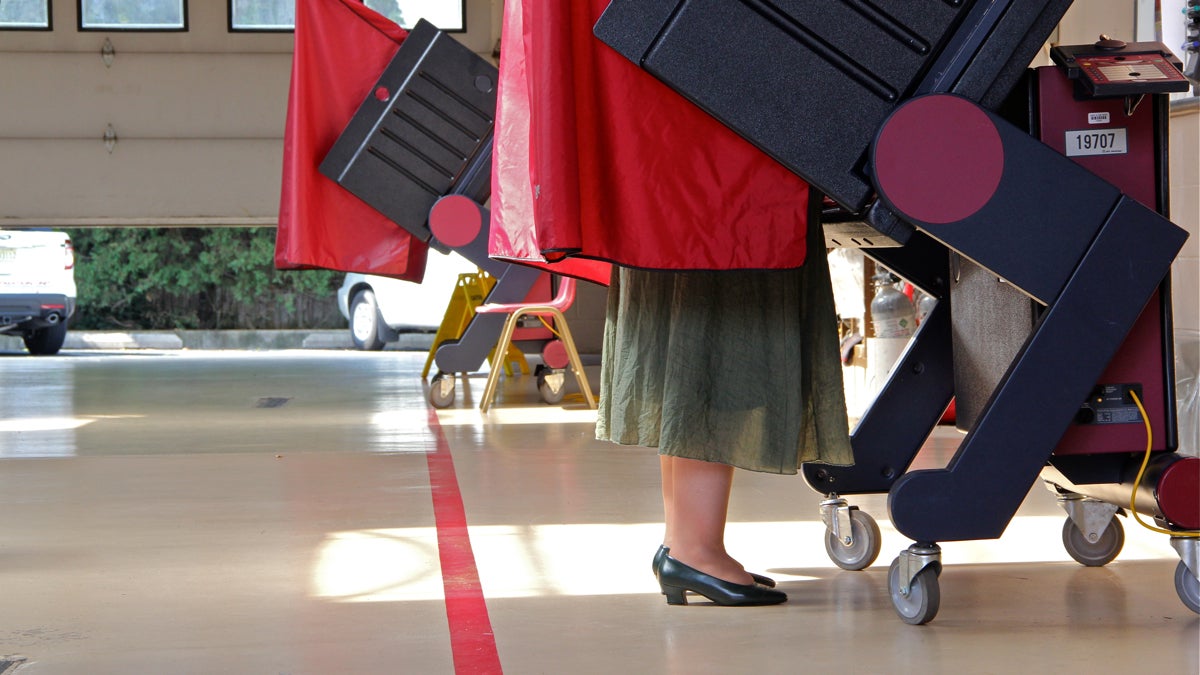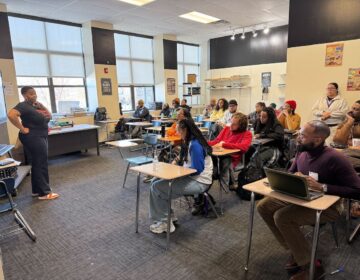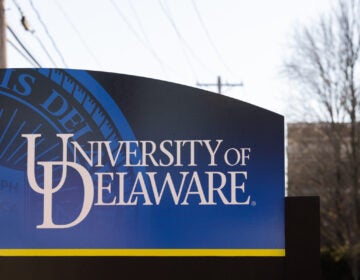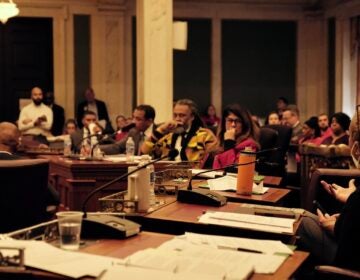Hesitating over terms, several Philly charters decline to sign renewal agreements with district

Students fill the halls between classes at Boys Latin. The high school has refused to sign its charter agreement in protest. (Emma Lee/for NewsWorks, file)
Several Philadelphia charter schools signaled their displeasure with the district’s charter office by declining to sign renewal agreements before a Friday deadline, instead holding out for better terms.
The refusals highlight simmering tension between charters and the school district over how these publicly financed — but privately run — schools should be governed.
Several charter leaders and advocates said the school district wants them to sign agreements that overregulate and overburden their sector, sapping them of the flexibility to make needed reforms.
“We want to be accountable,” said David Hardy, CEO of Boys’ Latin of Philadelphia Charter School, one of those that has not signed its charter agreement. “But what they’re doing is beyond accountability. It’s almost dictatorial.”
“They try to treat us like children,” Hardy added.
Others, however, praise the charter office for taking a more thorough approach to charter reauthorization and approval, arguing it helps root out bad actors.
“Nobody likes to be told what to do, but this is public money, and it requires public oversight,” said Temple Law professor Susan DeJarnatt.
The school district set a 1 p.m. Friday deadline for 21 Philadelphia charter schools to sign five-year renewal agreements. The agreements are a standard part of the charter school landscape, laying out how charters must behave and what benchmarks they must meet to continue operating in Philadelphia.
More than a dozen holdouts
As of midday Friday, 13 charter schools had declined, so far, to sign agreements, according to the district. The district did not name those schools, but on its website posted a list of schools that will be on the SRC agenda for a final vote Monday. It’s reasonable to assume schools not included on that list have not come to terms with the district.
Though the number of holdouts is significant, district officials say, proportionally, it’s about in line with expectations. Last year, according to district spokesman Kevin Geary, only two of the five schools that received charter renewal agreements signed those agreements by the first deadline.
Geary downplayed the implications of the holdouts and said it was normal for there to be disagreement at this point in the renewal process.
“May 1st is another stop in the process as we work to establish high-quality charter schools,” he said.
The district has revamped its charter office in recent years as part of a broader attempt to professionalize and improve charter oversight. At core, the district’s aim is to ensure families pick charter schools that are properly vetted —both for organizational soundness and academic quality.
“The intended effect of all the investments we’re making in the charter school office is to increase quality across all of the schools,” said Superintendent William Hite in a recent interview about the charter office’s work.
Charter leaders and advocates generally agree with this sentiment. Disagreements emerge over how to ensure quality while also maintaining the independence charters were designed to have.
These types of disagreements are often legislated in densely worded charter agreements, which can run 40 pages or more.
Charter schools must sign renewal contracts before the district’s School Reform Commission can approve them.
The SRC was slated to vote Monday on all 21 schools — as well as two others that weren’t recommended for renewal and three others with applications still pending. It now appears likely that meeting will cover significantly fewer schools.
The 21 charters received renewal agreements after going through a yearlong review process. Their old charter agreements will expire at the end of June. If the district and the holdout charters can’t strike deals before then, the charters will enter murky territory. They will have no active charter agreements, but also will not have had their charters revoked.
A small handful of charters have continued to operate without active charter agreements over the past year.
Though conflict between Philadelphia charter schools and the district is nothing new, the scale and stakes of the clash seem to be growing.
Recounting the reasons not to sign
For months, the charter school office and Mastery Charter Schools — the city’s largest charter chain, as well as one of its most successful — have been unable to reach terms on renewal agreements for three schools: Mastery Shoemaker, Mastery Clymer, and Mastery Simon Gratz.
Mastery had two more schools — Mastery Pickett and Mastery Cleveland — up for renewal this year. Officials with the network say they will not sign renewal agreements for either school before the SRC vote on Monday.
Courtney Collins-Shapiro, Mastery’s chief innovation officer, said charter renewal agreement have gotten steadily more intrusive.
“It really feels like the school district is writing contracts at this point to close charters for any reason,” she said.
She added that the district is morphing “a little bit more into being almost like a puppet master where we’re going to tell you exactly how to run your school. And that was not the point of charter schools.”
Hardy of Boys’ Latin said it’s “very unlikely” his school will sign an agreement before Monday.
Jennifer Faustman, CEO of the Belmont Charter Network, sounded a similar note.
“The conditions are such that we’re really not feeling like we’re gonna be able to sign,” she said.
Belmont Charter Network has two schools — Belmont Elementary School and Inquiry Charter School — facing renewal.
Though each charter contract has slightly different conditions based on the past performance of each school, the district uses common language in many of its agreements. That boilerplate material has miffed some charter advocates.
“The provisions in this contract are substantively different than anything we’ve seen before,” said Mike Wang, executive director of Philadelphia School Advocacy Partners, a pro-charter lobbying group.
Wang, who called the new round of renewal contracts an “attack” on charter autonomy, said they were “part of a pattern of overreach” from the district’s recently revamped charter office.
Officials from across Philadelphia’s charter community — which includes 88 schools educating nearly 65,000 children — generally said no single provision in the new contracts triggered outrage. Rather, they said, it was a mountain of minor changes that amounted to a major assault on charter independence.
Specific changes in renewal agreement
WHYY/NewsWorks obtained a copy of one school’s renewal agreement with the name of the school removed. It shows some of the clauses that charter officials find unreasonable.
For instance, the new agreement appears to forbid charter schools from taking out loans against the per-pupil money they receive from the district–or at least limit their ability to do so. In other words, they cannot use their main source of revenue when trying to secure loans.
Wang believes that clause will hamstring charters looking to finance capital projects.
“It’s like telling someone you can’t use your salary as security to get a mortgage,” he said. “I’m not sure how you get a house in that situation.”
Geary, the school district spokespeson, said the clause is only intended to prevent charters from using per-pupil revenue to finance entities other than their own facilities. In other words, charters couldn’t use district funds to secure loans on behalf of “other charter schools, their CMO or any other affiliated entity like a community organization,” Geary wrote in an e-mail.
Another clause mandates that charter school boards meet once a month, while another forbids charters from operating day care, early childhood, or pre-K programs under the terms of the charter.
The new agreements double down on the disputed practice of setting enrollment caps for charter schools.
A 2016 court decision barred the district from imposing enrollment caps on charter schools, but they can still be negotiated between the district and charter schools. The new agreement obtained by WHYY/NewsWorks does contain an enrollment cap and several sources said many agreements, if not all, had enrollment caps.
The agreements say charters can only receive per-pupil funding for each pupil up to the enrollment cap. Additional students will not lead to more pay outs.
Still another clause would force charter schools to give families six weeks after earning a lottery acceptance to actually enroll in the school. Some schools prefer a quicker turnaround for planning purposes.
The backlash from charter officials, though, is less centered around one provision than it is around the overall tone and scope of the renewal agreements.
“I am concerned about what the long-term vision for what the charter-district relationship will look like and how charter schools are being treated in the city,” said Faustman.
Faustman and Shapiro both sounded alarms over academic standards embedded in the new charter agreements. The new agreements lay out more than a dozen academic benchmarks and indicate that failure to meet any of the benchmarks could result in immediate closure — even before the charter term expires.
“We’re being put under academic conditions that feel like a noose around our neck,” Faustman said.
The district, however, said new charter agreements had less specific conditions than in past iterations. Most schools have individually crafted conditions in their charter agreements. This year, the district said, the charter office only tacked on an average of three conditions. In the past, the district said, that number has been as high as 20.
Looking beyond the SRC
The changing political climate also seems to be feeding charter school concerns.
There’s been intensifying pressure on the district’s School Reform Commission to dissolve itself and for the city to create either an elected or appointed school board. Charter officials worry a prospective local board would be more hostile than the School Reform Commission and could seize on clauses embedded in their contracts to close down otherwise high-performing schools.
All this is happening as the district beefs up its charter office.
Over the past two years, the district’s charter school office has grown considerably — both in size and ambition. The office — which reports to the School Reform Commission — now issues charter evaluations every year on all schools that aren’t up for renewal. Schools up for renewal go through an intensive review process, as do schools applying for new charters.
DeJarnatt, the Temple Law professor, praised the charter school office’s efforts.
“I was deeply impressed by how thorough and thoughtful they were,” she said.
“It is to be admired, not criticized.”
In the past, charter advocates have accused the district’s charter office of turning down quality charter applicants because of financial concerns. Each new charter seat adds about $4,800 to the district’s balance sheet, according to a recent report by the Afton group.
This latest batch of renewals is a fitting litmus test because it’s so large. The district has rarely decided the fate of so many schools at once.
The district’s charter office recommended the vast majority of schools for renewal. Of the 26 up for renewal, the office suggested shuttering only two schools. It has yet to release recommendations for three other schools.
Update: There are opposing intepretations of how a clause in the new renewal contracts would impact charter school borrowing. This article has been updated to include the school district’s interpretation of that clause.
WHYY is your source for fact-based, in-depth journalism and information. As a nonprofit organization, we rely on financial support from readers like you. Please give today.





